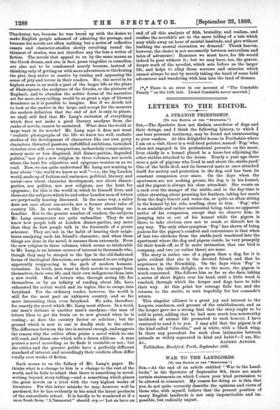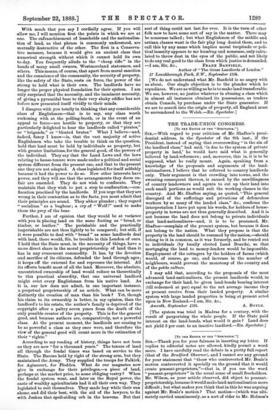WAR TO THE LANDLORDS.
[To THE EDITOR OP THE "SPECTATOR."] SIR,—At the end of an article entitled " War to the Land- lords," in the Spectator of September 8th, there are made certain statements on which I crave your kind permission to be allowed to comment. My reason for doing so is this, that you do not quite correctly describe the opinions and views of those who, with myself, believe that the present position of many English landlords is not only impracticable and im- possible, but radically unjust.
With much that you say I cordially agree. If you will allow me, I will mention first the points in which we are at one. The enfranchisement of leaseholds and the nationalisa- tion of land, as that phrase is commonly understood, are mutually destructive of the other. The first is a Conserva- tive measure, because it would give an ancient class that numerical strength without which it cannot hold its own to-day. You frequently allude to the " cheap rifle " in the hands of many small owners, Westmoreland statesmen, and others. This means, of course, that apart from moral sanction and the conscience of the community, the security of property, like the safety of the State, rests on force, the power of the strong to hold what is their own. The landlords have no longer the proper physical foundation for their system. I am only surprised that the necessity, and the imminent necessity, of giving a pyramidal base to their very shaky edifice has not -before now presented itself vividly to their minds.
I disagree with you totally in thinking that any considerable elass of Englishmen—that is to say, any class worth reckoning with at the polling-booth, or in the event of an appeal to force—are hostile to property, or that they are particularly delighted to hear the landlords called " pirates,"
• or " brigands," or " bloated brutes." What I believe—and, indeed, fancy I know—is, that the vast majority of active Englishmen who take the trouble to think on the question, hold that land must be held by individuals as property, but with greater limitations, for the general good, of the powers of the individual. They say that the Land Laws and the laws relating to house-tenure were made under a political and social system different from the present one, and that to the present one they are not adapted. A class legislated for itself selfishly because it had the power to do so. Now other interests have power, and they will see that the arrangements they deem un- fair are amended. They do not wish to confiscate. They maintain that they wish to put a stop to confiscation,—con- fiscation practised by the landlords. If you urge that they are wrong in their contention as to the facts, you must admit that their principles are sound. They abhor plunder ; they regard " socialism " as a bugbear ; a cry of " Wolf !" used to make them the prey of the bear.
Further, I am of opinion that they would be at variance with you in placing land on the same footing as " bread, or timber, or leather." The perishable and the practically imperishable are not thus lightly to be compared; but still, if it were possible to deal with " bread " as some landlords deal with land, there would, Sir, be trouble in this London of ours. I hold that the State must, in the necessity of things, have a more direct share in the moral proprietorship of land than it bas in any evanescent commodity. It has, by the devotion and sacrifice of its citizens, defended the land through ages; it keeps off the external foe and represses the internal. All its efforts benefit most of all the land. Moreover, the absolute, unrestricted ownership of land would reduce us theoretically to this practical absurdity, that one universal landlord might evict every Englishman from his native land. As it is, our law does not admit, in one important instance, a perpetual proprietorship of an article. What can be more distinctly the creation of man than his book P Yet, though his claim to its ownership is better, in my opinion, than the landlord's to his estate, the author's family is deprived of the copyright after a paltry seven years from the death of the ,only possible creator of the property. This is for the general good, and because authors are, comparatively, not a powerful elass. At the present moment, the landlords are ceasing to be so powerful a class as they once were, and therefore the view of the general good will count more in the estimation of their " rights."
According to my reading of history, things have not been as they are now "for a thousand years." The tenure of land all through the feudal times was based on service to the State. The Barons held by right of the strong arm, but they maintained the Army. They supplied the troops for Falkirk, for Agincourt, for Flodden. What do our magnates now give in exchange for their privileges,—a piece of land, perhaps at the market price, to some obliging vestry ? When the feudal system went, and later on the Royal power, the .caste of wealthy agriculturists had it all their own way. They legislated to suit themselves. They made hay while their sun shone, and did their best, with the aid of the lawyers, to fix with Joshua that spoil-aiding orb in the heavens. But that sort of thing could not last for ever. It is the turn of other folk now to have some sort of say in the matter. There may be nonsense talked ; but what Englishmen of the middle and artisan classes want is the fair play long denied them, and to call this by any name which implies moral turpitude or poli- tical insanity appears to me humbug and nonsense, only calcu- lated to throw dust in the eyes of the public, and not likely to do any real good to the class from which justice is demanded.
—I am, Sir, &c., FRANK BARFIELD,
Author of " The Great Landlords of London." 17 Loughborough Park, S.W., September 15th.
[We do not understand what Mr. Banfield is so angry with us about. Our single objection is to the plunder which he repudiates. We are as willing as he is to make land transferable. We see, however, no justice whatever in abusing a class which in almost all instances obtained its possessions, as traders obtain Consols,. by purchase under the State guarantee. If we are to search into the origin of property, all England must be surrendered to the Welsh.—En. Spectator.'



































 Previous page
Previous page